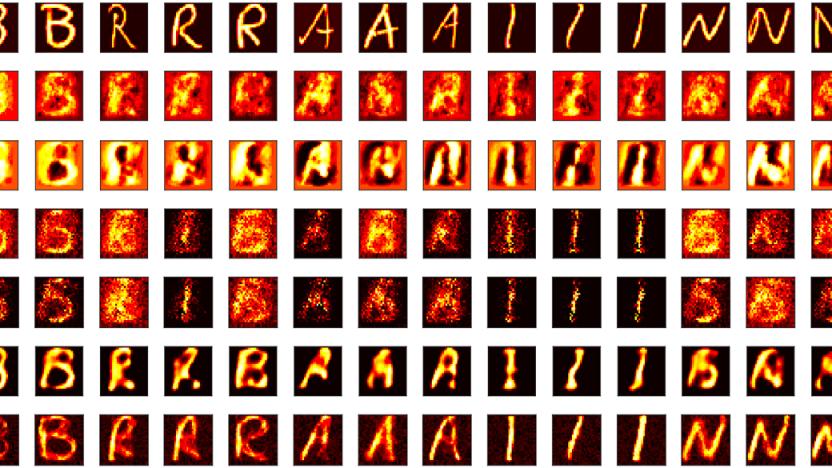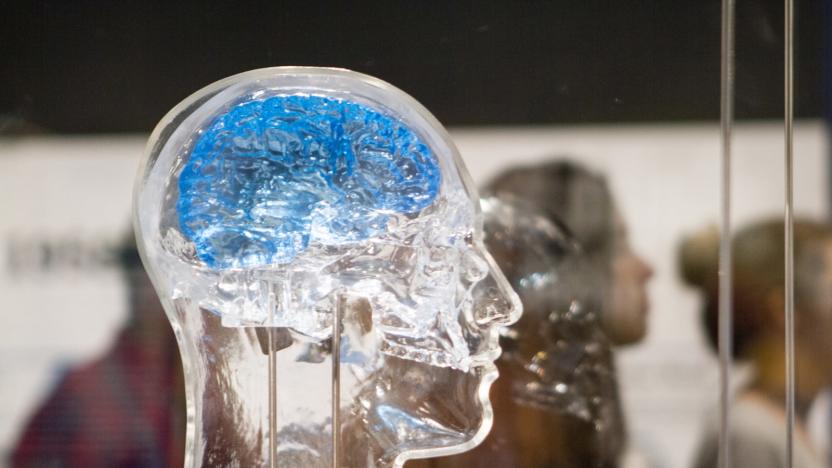fMRI
Latest

MIT study finds neurons in epilepsy patients that only respond to singing
The study’s participants were all epilepsy patients.
Amrita Khalid02.23.2022
AI could study your brain to help teachers improve their courses
Teachers don't always know how well their methods work. They can ask questions and hand out tests, of course, but it's not always clear who's at fault if the message doesn't get through. AI might do the trick before long, though. Dartmouth College researchers have produced a machine learning algorithm that measures activity across your brain to determine how well you understand a given concept.
Jon Fingas06.23.2019
An algorithm could identify suicidal feelings based on brain scans
It's difficult to identify whether or not someone is feeling suicidal by asking. According to studies, roughly 80 percent of those who go through with the act denied feeling suicidal the last time they spoke to a mental health care expert. However, AI-related technology -- which is also being applied to things like spotting cancerous cells -- might offer a way to identify these thoughts and prompt a timely intervention. Researchers have developed a machine learning algorithm that identifies suicidal tendencies based on activity in specific brain regions.
Jon Fingas11.01.2017
Neural network learns to reproduce what your brain sees
Scientists dream of recreating mental images through brain scans, but current techniques produce results that are... fuzzy, to put it mildly. A trio of Chinese researchers might just solve that. They've developed neural network algorithms that do a much better job of reproducing images taken from functional MRI scans. The team trains its network to recreate images by feeding it the visual cortex scans of someone looking at a picture and asking the network to recreate the original image based on that data. After enough practice, it's off to the races -- the system knows how to correlate voxels (3D pixels) in scans so that it can generate accurate, noise-free images without having to see the original.
Jon Fingas05.09.2017
Brain mapping could lead to better Parkinson's treatments
When you repair electronics, you frequently test individual parts to see how they affect the whole. Why not try that with the brain? Stanford is doing just that. It developed a technique that fires specific kinds of neurons to map the brain and identify problems caused by Parkinson's and other diseases. The approach first uses optogenetics to make neurons activate in response to light, and follows up with a functional MRI scan to look for the increased blood flow that indicates activity in other brain regions. A computational analysis maps that particular neural circuit and helps determine its role.
Jon Fingas01.30.2017
Religion and gambling have the same effect on your brain
Finding Jesus can feel a lot like falling in love, winning an award or getting high because all of these events activate the same reward circuits in the brain, according to a new study from the University of Utah. Researchers studied fMRI scans of 19 devout Mormons as they were exposed to prayer, scripture and sermons designed by the LDS Church to evoke spiritual feelings, and found reproducible activation in the nucleus accumbens, a region in the brain associated with reward and pleasure.
Jessica Conditt11.29.2016
Scientists think this is where your consciousness lives
You're reading this right now. Yes, sure, your eyes are converting incoming photons into electrical impulses which travel up the optic nerve into your visual cortex, which in turn processes that information into coherent thought. But you -- the active consciousness that constitutes your personality-- are reading this. And now a team of Harvard scientists think they've figured out how that works.
Andrew Tarantola11.08.2016
Neuroscientists accurately predict intelligence with an fMRI scan
If fingerprints can identify individual people, imagine what a brain-print could reveal -- namely, how you think and how intelligent you are. Neuroscientists studied fMRI scans of 126 patients in the Human Connectome Project, a consortium helping to map the human brain, and found consistent connections that accurately predicted "fluid intelligence," or abstract reasoning. Their findings were published today in the journal Nature. Researchers found that the more certain regions of the brain spoke to each other, the more likely a person was to quickly process information and make inferences, Yale grad student and study co-author Emily Finn told Wired. For example, a strong connection between the frontal and parietal lobes, two areas involved in high-level functions, accurately predicted a high fluid-intelligence score.
Jessica Conditt10.12.2015
BU wizards find success in unconscious neurofeedback learning, announce plans for secret lair
You will learn French this week, even if you're not aware that it's happening. Neuroscientists at Boston University have discovered that patients can quickly learn new skills while having their brain patterns modified via decoded functional magnetic resonance imaging. The group found that pictures gradually build up inside a person's brain, appearing first as lines, edges, shapes, colors and motion in early visual areas with the brain then filling in greater details as needed to complete the object. From there, a correlation was confirmed between increased visual learning and fMRI neurofeedback, repetitions of the activation pattern leading to long-lasting performance improvement. Interestingly, the approach worked even when test subjects were not aware of what they were learning... which is why that sweater you unconsciously knitted last night should fit Johnny Boy like a glove.
Chris Barylick12.10.2011
Princeton neuroscientists map your brain, play words with subjects
Don't speak. Princeton researchers know just what you're saying -- kind of. Alright, so the Ivy league team of neuroscientists, led by Prof. Matthew Botvinick, can't yet read your minds without the help of a functional MRI, but one day the group hopes to take your silent pauses and broadcast them for public consumption. By mapping highlighted areas of brain activity to words meditated upon by subjects, the group was able to create "semantic threads" based on "emotions, plans or socially oriented thoughts" associated with select neural activity. So, what good'll these high-brow word association experiments do for us? For one, it could pave the way for automatic translation machines, extending a silicon-assisted grok into our nonverbal inner worlds that churns out computer-generated chatter; giving a voice to those incapable of speech. And if it's used for bad? More terrifically horrific psychobabble poetry penned by Jewel's unencumbered mind. Actually, wait. We might be into that.
Joseph Volpe09.03.2011
Canadian scientists scan your brain, know how you want to hold your hand
O Canada -- your wacky scientists are at it again. And this time, the bright minds over at the University of Western Ontario have their third eye set on a certain precognitive prize. Avoiding the messier open-skull, electrode-imbedding alternative, researchers at the Centre for Brain and Mind employed functional magnetic resonance imaging (fMRI) to successfully predict the action of participants' hands before they'd moved a muscle. After a year of brain-scanning trials, scientists learned to accurately foretell which signals were linked to one of three set actions: grabbing the top of an object, its bottom, or simply reaching out to touch it. Like our clairvoyant cousin's previous beverage-predicting breakthrough, the spoils of this study go to prosthetic limb motion control and the paralyzed who'll use it. We know what you're thinking, but we're not going to make the obvious Thing joke here. Instead, we have to wonder -- What Would Ms. Cleo Do? Full release after the break, but you already knew that.
Joseph Volpe07.05.2011